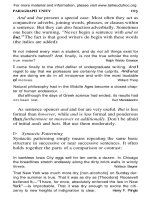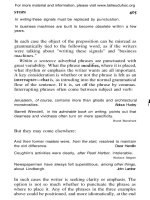Tài liệu Essential guide to writing part 18 docx
Bạn đang xem bản rút gọn của tài liệu. Xem và tải ngay bản đầy đủ của tài liệu tại đây (284.31 KB, 15 trang )
CLARITY AND SIMPLICITY
Some connectives are prone to ambiguity. Or, for instance,
can signify (1) a logical disjunction, that is, A or B but not
both; and (2) an alternative name or word for the same thing:
"The shag, or cormorant, is a common sea bird along the New
England coast." Because after a negative statement may also
be ambiguous:
We didn't go because we were tired. ("We did not go and the
reason was that we were tired"; or, emphatically, "We did go and
we certainly were not tired"?)
On other occasions ambiguity lurks, not in a single word,
but in an entire statement:
liked this story as much as liked all his others. ("I like all his
stories, including this one"; or "I don't like any of his stories, in-
cluding this one"?)
So be it, until Victory is ours, and there is no enemy, but Peace.
("... there is no enemy, and now we have Peace"; or "... there
is no enemy except Peace"?)
Clever writers exploit ambiguity as a kind of irony, seem-
ing to say one thing while meaning another. Joan Didion, in
the following description of a wedding, wryly comments on
marriage by using "illusion" both in its technical, dressmak-
ing sense of a bridal veil and in its more commonplace mean-
ing of a false hope or dream:
A coronet of seed pearls her illusion veil.
And the nineteenth-century statesman and novelist Benjamin
Disraeli had a standard response to all would-be authors who
sent him unsolicited manuscripts:
Many thanks; shall lose no time in reading it.
For more material and information, please visit www.tailieuduhoc.org
268 DICTION
Connotation
The connotation of a word is its fringe or associated mean-
ings, including implications of approval or disapproval. (See
pages 179 ff.) When a connotation pulls awkwardly against
the context, even though the basic meaning of the word fits,
the term must be replaced. In the following sentence, for ex-
ample, unrealistic has the wrong connotations for the writer's
purpose:
In such stories it is exciting to break away from the predictable
world we live in and to enter an unrealistic world where anything
can happen.
The problem is that the writer approves of the story because
it stimulates the imagination. But usually unrealistic connotes
disapproval ("Don't be so unrealistic"; "Her plan is too un-
realistic to work"). Thus while the basic meaning (or deno-
tation) of unrealistic fits, its connotations do not. Such terms
fantastic, unpredictable, imaginary, be
more appropriate.
Barbarisms
A barbarism is either a nonexistent word or an existing one
used ungrammatically. Inventing new words is not necessarily
a fault; imaginative writers create they are
called. But a genuine neologism fills a need. When an invented
word is merely an ungrammatical form of a term already in
the language, it serves no purpose and is a barbarism:
She's always been a daughter. (For dutiful)
Barbarisms are often spawned by confusion about suffixes,
those endings which extend the meaning or alter the gram-
matical function of example, as when -ness turns
the adjective polite into the politeness.
For more material and information, please visit www.tailieuduhoc.org
CLARITY AND SIMPLICITY 269
Sometimes a barbarism is the result of adding a second,
unnecessary suffix to a word to restore it to what it was in
the first place:
He has great (For ambition)
The story contains a great deal of satiricalness. (For satire)
Aside from nonexistent words, barbarisms also include le-
gitimate ones used ungrammatically. Confusion of sound or
appearance often causes this error:
Garbage is also used to fill holes were houses are to be built. (For
where)
The average man is not conscience of his wasteful behavior. (For
conscious)
should of gone. (For should've)
A women stood on the corner. (For woman)
The chances of confusion are even greater with homonyms,
different words pronounced the same (and sometimes spelled
alike as well): bear ("carry"), bear ("animal"), and bare ("na-
ked"). Especially prone to misuse are the forms there (ad-
verb), their (possessive pronoun), and they're (contraction of
they are); and to (preposition), too (adverb), and two
(adjective).
Legitimate words may become barbarisms when misused
in grammatical shifts. As we'll see in the next chapter, gram-
matical shifts can be valuable in writing. (It means changing
the normal grammatical function of a word, turning a noun,
for example, into a verb, as in "The car nosed down the
street.") But if it serves no valid purpose, such a shift is simply
a barbarism:
Our strive for greatness is one of our best qualities. (For striving)
They made their deciding. (For decision)
For more material and information, please visit www.tailieuduhoc.org
DICTION
Awkward shifts are common with adjectives and adverbs.
Usually the problem is leaving off a
She dances beautiful. (For beautifully)
They did it satisfactory. (For satisfactorily)
A rough rule is that adverbs of three or more syllables end
and that those having one or two syllables are rather
idiomatic: some always end (deadly), others never do
(welt), and still others may be used either way (slow or slowly,
quick or quickly).
On the fringe of barbarism are many trendy words such as
finalize and adverbs ending in-wise such as weatherwise,
wise, economywise. There seems little
for a word like finalize, which says nothing that complete or
finish does not say. On the other hand, one can argue that
weatherwise is at least more concise than the phrase in regard
to the weather. One's tolerance for such terms depends on
how liberal or conservative one is with regard to language (or
languagewise).
Idiom
An idiom is a combination of words functioning as a unit of
meaning, as in "to take the subway [bus, streetcar] home."
Often one or more of the words has a special sense different
from its usual meaning and confined to that idiom. Thus to
take here means "to get on and travel in." In its idiomatic
sense such a word cannot be replaced by any of its usual
equivalents: we cannot bring, or fetch the subway
home."
Idioms are always a difficulty in learning foreign languages.
They are not easily reduced to rules and each must be
orized. Even native speakers make mistakes with idioms. The
most frequent errors involve verb-preposition combinations:
For more material and information, please visit www.tailieuduhoc.org
CLARITY AND SIMPLICITY
complained with my parents about their attitude.
IDIOMATIC: complained to
She concluded in saying....
IDIOMATIC: concluded by
That is where we fool ourselves of our efficiency.
IDIOMATIC: fool ourselves about
They can't decide what to do with their problem.
IDIOMATIC: do about their problem
Errors like these probably come from confusing two idioms
{complain about and argue with, for example), or from se-
lecting an inappropriate one of several possible verb-
preposition idioms (we do with physical
shall we do with this we do about problems,
difficulties, abstractions of various shall we do
about that crack in the vase?").
Although they are most likely with verbs and prepositions,
mistakes in idiom occur with other grammatical patterns.
Some verbs, for instance, do not combine idiomatically with
certain objects:
People only look out for prestige. (Prestige is looked for, valued,
esteemed.)
Robert Frost gives the image of a silken tent in a field. (Poets create
or develop images.)
Adjectives and nouns also enter into idiomatic combina-
tions:
We have a great standard of living.
IDIOMATIC: high
The English prefer dining-room comedy.
IDIOMATIC: drawing-room comedy
For more material and information, please visit www.tailieuduhoc.org
Colloquial and Pretentious Diction
Colloquialisms are expressions appropriate to informal, con-
versational occasions. In writing they may sound out of
place:
We have a swell professor of mathematics.
BETTER: nice, interesting, pleasant
Colloquial words are a problem when they fit awkwardly
with their contexts or when they are vague. And frequently
colloquialisms are vague. (What, for example, does swell mean
in the sentence above?) In speech we compensate for verbal
vagueness by gestures, tone of voice, the common ground of
knowledge and experience we share with our friends. None
of these aids to communication is available to the writer.
On the other hand, some colloquialisms are remarkably
expressive, and these are more acceptable now than they were
a generation ago, when writers were more scrupulous about
levels of usage. Today, we feel freer to mix formal words and
colloquial ones. The result, if controlled by word sense and
taste, is a clear gain in precision and variety (italics added in
both cases):
Joan's voices and visions have played tricks with her reputation.
George Bernard Shaw
There's another wrinkle to this. Elizabeth
An extreme form of colloquialism is slang. We all use slang,
and we all recognize it. But we find it very difficult to define.
Sometimes slang is an ordinary word given a special meaning:
heavy in the sense of serious, or cool in the sense of unper-
turbed or a little better than all right. Other slang terms occur
only as for instance.
Slang tends to be short-lived: that of one generation sounds
silly to the next. (There are exceptions; some slang terms are
For more material and information, please visit www.tailieuduhoc.org









